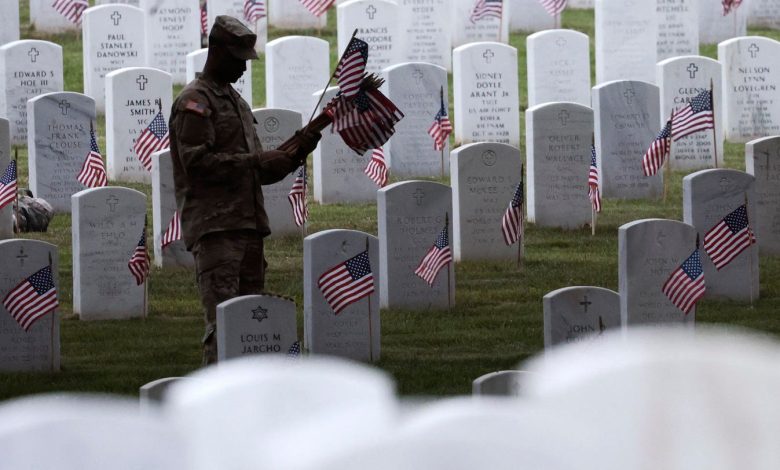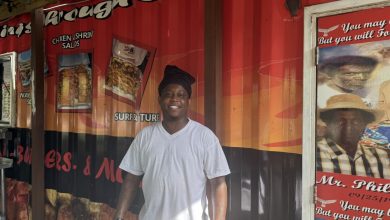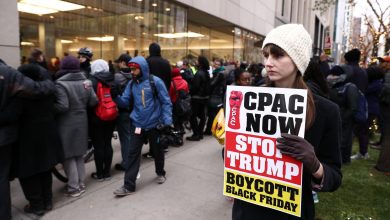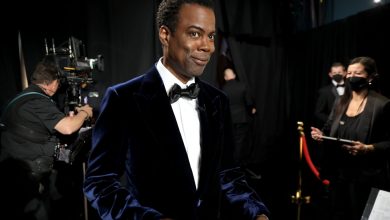As We Honor Our Veterans This Memorial Day, It Was Black Soldiers Who Sparked Its Origins

ARLINGTON, VIRGINIA – MAY 25: (EDITOR’S NOTE: Alternate crop) Members of the 3rd U.S. Infantry … More
Memorial Day in America is symbolic in many ways.
For many, it marks the end of the school year, a weekend for graduations and a federal holiday for millions of working Americans, providing a day off to honor the American soldiers who fought and died for our country.
While Memorial Day is often associated with barbecues, parades and the unofficial start date of summer, it’s rooted in an important story—one that has largely been erased or overlooked in mainstream narratives.
As part of the White House DEI directive, which has affected the labeling at Arlington National Cemetery, the reading curriculum at the U.S. Naval Academy and the naming reversals of military bases, the question of what is and should or shouldn’t be labeled as American history has become front-page news.
The origin story of Memorial Day begins in the aftermath of the Civil War.
In Charleston, South Carolina, thousands of formerly enslaved Black Americans organized a Memorial Day commemoration for deceased Union soldiers who had lost their lives in the Civil War (1861–1865). This brutal conflict was a defining chapter for the United States, claiming over 600,000 lives and leaving the nation deeply scarred both socially and financially. At its core, the war was a battle over freedom and the institution of slavery, which had become the economic backbone of the South.
By 1860, the value of enslaved people in the United States was estimated between $2.7 billion and $3.7 billion—more than the combined value of all railroads and factories in the entire country. This staggering figure underscores the centrality of slavery to the American economy and the immense human cost of this system.
The Charleston Memorial Day Is A Forgotten Beginning
On May 1, 1865, just weeks after the Civil War had ended, a somewhat impromptu event unfolded at the Washington Race Course in Charleston, South Carolina. At that time, the race course had been turned into a Confederate prison camp for Union soldiers. Forgotten and abandoned, the 257 Union soldiers who were in captivity on the grounds would end up dying there, in captivity as prisoners of war. Thus, a site that had once been a gathering place for events was transformed into a mass grave.
Thousands of recently emancipated Black residents living in that area came together at the race track to honor and celebrate their lives, as well as others who had died during the war.
That moment would birth the of idea of Memorial Day.
This act of remembrance was deeply symbolic. By honoring the Union’s deceased soldiers, the Black community in Charleston was creating a moment in the nation’s history, showing gratitude to those who had fought for their emancipation. It was a powerful statement of resilience, unity and hope for a better future.
The locals exhumed the fallen bodies from the mass grave, taking the time to dress and rebury them individually in separate graves, decorated with flowers. They also organized a parade led by Black schoolchildren carrying roses, followed by Union soldiers and community members. The event included hymns, readings and a picnic—a celebration of both the soldiers’ sacrifice and the newfound freedom of the formerly enslaved.
Eventually they would be allowed to wear Union Blue and fight for their freedom but for now they … More
The Erasure of Black American Contributions
Despite its significance, the Charleston Memorial Day celebration and the broader contributions of Black Americans, historically, have been erased from public memory and history books. Over time, Memorial Day’s origin story became associated with the Grand Army of the Republic (GAR), an organization of Union veterans that established Decoration Day as a national observance on May 30, 1868. By the time Memorial Day became an official federal holiday over 100 years later in 1971, its beginning in Charleston, led by the Black community, had been all but forgotten.
Erasure is part of a broader pattern of sidelining Black contributions to the overall cannon of American history, often minimizing the role of African Americans in shaping the nation. This lack of recognition not only distorts our understanding of history but also perpetuates systemic inequities. It is crucial to reflect on the stories that have been left out of the narrative.
The Charleston commemoration reminds us that the fight for freedom and equality is deeply intertwined with the sacrifices of those who came before us. And the event underscores the importance of acknowledging and honoring the contributions of all Americans, regardless of race. By reclaiming these stories, we can ensure that the legacy of those who fought for freedom is not forgotten.
(Original Caption) 5/30/1922-New York, NY: Some of the few remaining G. A. R. veterans marching in … More
We Must Make the Invisible, Visible
Today, we can confront the complexities of our history and honor the diverse voices that have shaped our nation. As we lay wreaths and wave flags, let us also remember the Black Americans who, in the face of unimaginable adversity, organized one of the earliest Memorial Day commemorations.
This forgotten moment from our nation’s past reminds us that the fight for justice and equality is ongoing and that the stories we choose to tell—and those we choose to omit—shape our collective identity.
It’s important that we seize every opportunity to make the invisible visible and commit to a more inclusive understanding of our history, honoring not only the soldiers who gave their lives but also the communities that have fought to ensure the soldiers’ sacrifices are remembered.
In doing so, we can honor the memory of the fallen and move closer to the ideals of freedom and equality that Memorial Day represents.




